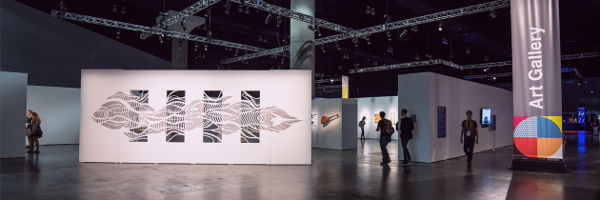| SIGGRAPH Art 2016 |
| Written by David Conrad | |||
| Sunday, 24 July 2016 | |||
|
SIGGRAPH has just started and before we get lost in the amazing technical advances there is time to pause and take a look at this year's art works in the 2016 Art Gallery. With ten exhibits there isn't time to do them all justice but here are the ones I liked.
SubmergenceTake a 2D LED display and turn it into a 3D display. The result is something that looks like a digital crystal and an augmented reality. The LED ropes hang down and are free to move as someone walks through. I can only imagine what the sensation of walking among the changing lights would be like - make sure you watch the end of the video where the pace hots up and it gets increasly "trippy".
What I really liked about it is that I could think of lots of things I'd like to try out. So far it seems that it hasn't been explored completely and there is scope for additional sensors and algorithms. I even thought of a games to play - 3D Tetris anyone? DoorsDoors is another augmented reality style display, but it relies much more on sensors to react to the viewer. The display built into the door frame is almost certainly more effective in convincing you that what you are seeing is real because it moves with you. My guess is how good the illusion is depends on the implementation. Worth experimenting with perhaps on a smaller scale, now where did I put that old monitor.
PixelBotsYou might well have seen PixelBots before. The idea is to build a swarm of robots that can move around and change colour. The purpose is to create a new type of display where the pixels actually move - try working out the resolution of that! As you watch the video consider what they could be used for and how they might be made more effective. I can only see them as entertainment and advertising and more PixelBots would be better.
The other exhibits have some interest, but for me they were all too hooked into data and politics rather than visual impact. For example, Crime Scene made me smile, but the joke quickly wears off - two computers forever copying a copyrighted file between them so breaking the law repeatedly. I wonder if the copyright owner will show up and turn it into a police drama. One fairly slight piece that I did like and want to share is Grafikdemo. Take the standard teapot demo and put it inside a Commodore PET case - not as a rendered graphic, but as a real physical wireframe teapot. The user can rotate it 3D graphics style, but it is actually rotated using motors.
Perhaps my response to Grafikdemo is a personal result of having spent too long in the past with both of the objects that make it up but I doubt that I am alone in this. More Informationhttp://s2016.siggraph.org/content/art-gallery Related ArticlesPainting in Millions of Colors Arduino And More Comes To MoMA
To be informed about new articles on I Programmer, sign up for our weekly newsletter, subscribe to the RSS feed and follow us on, Twitter, Facebook, Google+ or Linkedin.
Comments
or email your comment to: comments@i-programmer.info |
|||
| Last Updated ( Sunday, 24 July 2016 ) |



